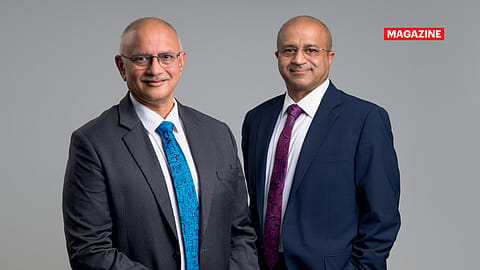India’s Best CEOs 2025: How Anand Deshpande and Sandeep Kalra of Persistent Systems have Raced Ahead
Winner-IT SERVICES (₹10,000-50,000 crore): Persistent’s new-found aggression is yielding favourable results, both in revenue and profit numbers.

This story belongs to the Fortune India Magazine indias-best-ceos-november-2025 issue.
GeBEING A SPORTS enthusiast, it is only natural for Sandeep Kalra, CEO of Persistent Systems, to liken the current global uncertainties to the twists and turns of a Formula 1 race. “People don’t win the race when they are going straight. You win the race over the bends. Your skill comes in navigating those bends and overtaking others at those bends. Everyone can drive fast in a straight line,” he says.
His company, Persistent Systems, is living proof. The bends, or the business uncertainties, prompted the IT major to outpace its peers in growth. In FY25, when the industry saw moderate, low single-digit growth — Persistent logged an 18.8% YoY rise in dollar revenues to $1.4 billion, from $1.2 billion in FY24, all while navigating the twists of AI advancements, a new team at the White House, and the challenges stemming thereof. Profits, meanwhile, registered a 3-year CAGR of 26.6% (FY22-25) in rupee terms.
“I’m confident [that] whether it’s our customers or us, the people who take bold decisions, who give their best, will emerge as winners,” Kalra says.
For a sector reeling under the uncertain macro environment, cost take out and vendor consolidation projects have been holding up growth. Notably, AI infusion in deals has become mainstream. For the Pune-headquartered firm, AI is a big part of the strategy to counter headwinds in both renewals and new deals. Instilling data readiness among customers for AI-related deployments has been integral, Kalra explains. It is also an area where larger programmes and projects are anticipated. “We are dealing with Fortune 500 and even mid-market companies to get them ready to adopt AI from a data infrastructure readiness perspective.”
At the heart of Persistent’s AI story are SASVA and iAURA, launched last year. While SASVA is a GenAI-powered digital engineering platform, iAURA is an enterprise data management solution that helps in drawing actionable insights, data migration, and other data management-related needs. Persistent has nearly 75 patents for SASVA, which streamlines the entire software development lifecycle. Its key differentiators include on-premises deployment tailored for regulated industries and an optimised GPU infrastructure that reduces scaling costs. iAURA, which has 30-plus agents across industries in process and document intelligence, was upgraded with agentic capabilities this year.
As more enterprises get their data ready for AI layering, Persistent hinges on greater penetration of industry AI agents going ahead. “We are playing in this [segment] in a systematic manner, building IPs, doing partnerships wherever relevant,” Kalra adds.
While the BFSI sector has been an outlier in demand amid uncertainties, the CEO sees an AI demand uptick in the hi-tech sector, providing adequate tailwind right from hyperscalers to startups. “We have been successful in taking our own platform or capabilities to these companies, where mid-market and private equity firms are happy working with us to adopt the technology,” he says, adding that deal wins and pipelines have been encouraging in recent quarters.
More Stories from this Issue
Anand Deshpande, founder, chairman, and MD, attributes Persistent’s new-found aggression to its ability to anticipate changes and the willingness to disrupt oneself. “It’s not the size that makes the difference but what you do with your capabilities,” he says. However, the industry veteran, with over three and a half decades of experience, has a word of caution: amid rapidly evolving technologies, any edge a company enjoys today may not necessarily hold tomorrow.
